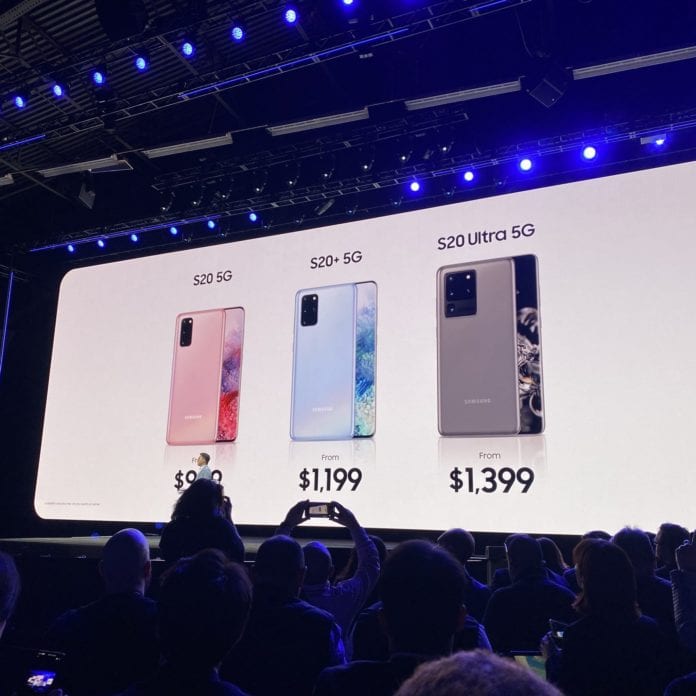Samsung Galaxy S20, S20+ and S20 Ultra all support 5G, dynamic spectrum sharing
SAN FRANCISCO–The coming convergence of 5G, artificial intelligence and the internet of things will reshape mobile consumer experiences and Samsung is leaning in with a full slate of 5G-compatible phones announced today at the Galaxy Unpacked event.
Coming on Feb. 14, all three of the new Galaxy smartphones will support dynamic spectrum sharing, a key piece of operator plans to extend 5G into lower bands without re-farming spectrum, and are compatible with non-standalone and standalone 5G networks. The S20 Ultra and S20+ device variants support 5G at both sub-6 GHz and millimeter wave frequencies while the S20 only supports sub-6 GHz 5G.

Samsung’s Tae Moon Roh, speaking onstage in the Palace of Fine Arts, said, “We are driving the convergence of the three most important technologies of our time: 5G, AI and IoT. And now Samsung is making 5G available to more people. We are excited to show our next big step forward as we launch a new generation of intelligent connections.”
The phones
The Galaxy S20 is priced at $999 and features three rear-facing cameras and one front-facing selfie camera, a 4000 mAh battery, and a 6.2-inch AMOLED display with a 120 MHz display refresh rate. At $1,199.99, the Galaxy S20+ features four rear-facing cameras, a 4500 mAh battery, and 6.7-inch AMOLED screen. The top-tier Galaxy S20 Ultra, with a retail price of $1,399.99, features the quad rear camera configuration with enhanced zoom capabilities, a 5000 mAh battery, and 6.9-inch display.

In the U.S. and other countries, the new Samsung devices will be among the first featuring Qualcomm’s latest Snapdragon 865 system-on-chip, which was launched in December and will figure into most premium-tier, 5G devices in 2020.
In addition to the Galaxy devices, Samsung led its Unpacked presentation with the Galaxy Z Flip, a foldable device that was featured in a recent advertisement during the Oscars and appears to be Samsung’s answer to Motorola’s Razr.

This device “changes everything,” Samsung Head of UK Mobile Product Marketing Rebecca Hirst said. “We’re changing the shape of the future.” She characterized the device as a “statement smartphone” for “trend-setters and trailblazers.” This device is priced at $1,380.
Among the more interesting features of the Z Flip hinge on the, well, hinge. The foldable form factor would allow a user to essentially use the phone as a camera and tripod. Similarly, when open around 90-degrees, the top and bottom portions of the display can be used for different tasks simultaneously.
The networks
Oftentimes major carrier network announcements come in tandem with major device manufacturer announcements and today was no exception. Both T-Mobile US and AT&T updated their 5G network expansions in time with Samsung’s device launches.
T-Mobile US, which this morning cleared a major hurdle in finalizing its $26 billion merger with Sprint, will sell all three Galaxy variants and used the occasion to tout continued expansion of its “nationwide” 600 MHz 5G network. Of note: If the merger closes, New T-Mobile would be the only carrier with low-, mid- and high-band spectrum holdings, as T-Mo has the 600 MHz and millimeter wave and Sprint has 2.5 GHz covering the top 100 metros.
“With the New T-Mobile, we’ll combine this core layer of 5G with Sprint’s 2.5 GHz mid-band spectrum to supercharge 5G, creating a broad and deep network for everyone,” T-Mo CEO John Legere said in a statement. “These are the first phones that can tap into all that power.”
AT&T has millimeter wave-based 5G, which it calls 5G+, up and running in 35 markets. It has its low-band 5G using 850 MHz available in 45 markets with 13 announced in tandem with the Samsung device announcements. AT&T says the low-band 5G service covers around 50 million people.
For Verizon and AT&T, dynamic spectrum sharing will be essential to achieving nationwide 5G coverage. T-Mobile, with the Sprint merger, wouldn’t necessarily need this technology and, as such, blasted its downsides in a recent quarterly earnings call. In a press release, Verizon reiterated that it will use DSS to expand 5G out of millimeter wave “later this year.”
Susan Welsh de Grimaldo, director of service provider strategies for Strategy Analytics’ Global Wireless Practice, discussed the Samsung device launches in the context of the T-Mobile, Sprint merger. She said in an email to RCR Wireless News, “The lineup of new Samsung smartphones that will tap into the array of spectrum in the New T-Mobile 5G wedding cake, now that they are getting hitched to their rival and hooking up their low- and high-band spectrum with some nice mid-band airwaves! With more lower cost 5G smartphones anticipated for the second half of the year, the merger is just in time for the new big player on the block to position as a disruptor for consumer 5G.”

